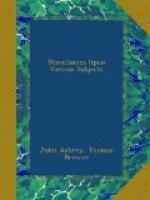Colenel Sharington Talbot was at Nottingham, when King Charles I. did set up his standard upon the top of the tower there. He told me, that the first night, the wind blew it so, that it hung down almost horizontal; which some did take to be an ill omen.
The day that the long Parliament began, 1641, the Sceptre fell out of the figure of King Charles in wood, in Sir Thomas Trenchard’s hall at Wullich, in Dorset, as they were at dinner in the parlour: Justice Hunt then dined there.
The picture of Arch-Bishop Laud, in his closet, fell down (the string broke) the day of the sitting of that Parliament. This is mentioned in Canterbury’s doom by W. Prynne.
The psalms for the eleventh day of the month, are 56, 57, 58, &c. On the eleventh day of one of the months in the summer time, the citizens came tumultuously in great numbers in boats and barges over against Whitehall, to shew they would take the Parliament’s part. The psalms aforesaid, both for morning and evening service, are as prophecies of the troubles that did ensue.
When the high court of justice was voted in the parliament house, as Berkenhead (the mace bearer) took up the mace to carry it before the Speaker, the top of the mace fell off. This was avowed to me by an eye witness then in the house.
The head of King Charles I’s. staff did fall off at his trial: that is commonly known.
The second lesson for the 30th of January in the calendar before the common prayer, is concerning the trial of Christ: which, when Bishop Duppa read, the King was displeased with him, thinking he had done it of choice; but the Bishop cleared himself by the calendar, as is to be seen.
King Charles ii. was crowned at the very conjunction of the sun and Mercury; Mercury being then in “Corde Solis”. As the King was at dinner in Westminster Hall, it thundered and lightened extremely. The cannons and the thunder played together.
King Charles ii. went by long sea to Portsmouth or Plymouth, or both; an extraordinary storm arose, which carried him almost to France. Sir Jonas Moor (who was then with his Majesty) gave me this account, and said, that when they came to Portsmouth to refresh themselves, they had not been there above half an hour, but the weather was calm, and the sun shone: his Majesty put to sea again, and in a little time they had the like tempestuous weather as before.
Not long before the death of King Charles ii. a Sparrow-hawk escaped from the perch, and pitched on one of the iron crowns of the white tower, and entangling its string in the crown, hung by the heels and died. Not long after, another hawk pitched on one of the crowns. From Sir Edward Sherborne, Knight.
The Gloucester frigate cast away at the Lemanore, and most of the men in it; the Duke of York escaping in a cock boat, anno 1682, May the 5th, on a Friday.
When King James ii. was crowned, (according to the ancient custom, the Peers go to the throne, and kiss the king) the Crown was almost kissed off his head. An Earl did set it right; and as he came from the Abbey to Westminster Hall, the Crown tottered extremely.




